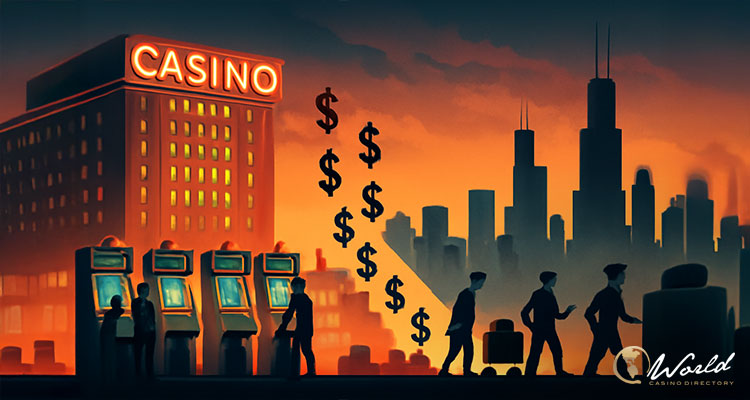Chicago, Illinois, is grappling with a contentious proposal to lift the ban on video gambling terminals (VGTs) in the city, a move that could bring substantial changes to its gaming landscape. Bally’s, which is currently constructing the city’s first-ever casino at a cost of $1.7 billion, has raised alarms, warning that such a change could result in a significant loss of revenue and job cuts at its facilities. While the casino operator cautions about the negative financial impact, particularly for the city’s budget and jobs, Alderman Anthony Beale remains determined to push forward with the plan, which aims to allow 700 bars and taverns to install video gambling terminals.
The Financial and Employment Impact of Video Gambling Expansion
Bally’s Vice President of Government Relations, Elizabeth Suever, warned that legalizing video gambling could lead to a loss of $70 million annually for the city, as well as a potential $260 million drop in taxes collected from Bally’s Chicago casino. This comes from the difference in tax rates between video gambling terminals and traditional slot machines. Video gambling terminals are taxed at a much lower rate than slot machines, which could undermine the financial benefits of the permanent casino. Additionally, Bally’s estimates that lifting the ban could lead to a reduction of 750 to 1,050 jobs, primarily in well-paying positions at the new casino. These job losses would have a direct impact on residents of the city, especially in a period when Chicago is already facing significant budgetary pressures.
Beale, undeterred by Bally’s concerns, argues that the city cannot afford to ignore the revenue opportunities video gambling could provide. With Chicago already struggling with a $1.15 billion budget shortfall, Beale sees video gambling as a potential solution to fill the financial gap. “If we turn a blind eye to almost $100 million, but then we want to raise taxes, fines and fees on the backs of the people, that’s a choice this body would have to make,” Beale stated in a meeting on Thursday. He added that over 3,000 illegal video gambling machines are already operating in the city without regulation, costing the city potential tax revenue.
Despite the warnings from Bally’s, some aldermen are skeptical of the company’s predictions. Alderman Brendan Reilly of the 42nd Ward dismissed Bally’s concerns as exaggerated, referencing how the casino’s temporary operations in River North fell short of revenue projections by millions. Reilly believes that the proposed tax changes are critical for the city’s financial health, particularly in terms of funding police and fire pension obligations.
The city’s own analysis on the impact of legalized video gambling has shown a mixed result. A study commissioned by the city indicated that, while the move could generate some revenue, it could ultimately end up costing the city money in the long run, due to the loss of slot machine revenue at the new Bally’s casino. The estimated net gain from video gambling terminals is only $10 million annually at best, and could even result in a net loss after accounting for the diversion of casino revenues. However, Beale remains hopeful that the Illinois General Assembly will adjust the tax structure to make video gambling more financially viable for the city.
Local Business Owners Back Video Gambling as Economic Relief
A key aspect of Beale’s proposal is the potential economic relief it could provide to local businesses. Pat Doerr, managing director of the Hospitality Business Association of Chicago, emphasized that video gambling could provide a much-needed financial boost to bars and restaurants that have struggled in the wake of the COVID-19 pandemic. These establishments, particularly those located in border neighborhoods, have faced stiff competition from businesses across state lines that already offer video gambling. “Video gambling would help that — especially in border wards where your businesses have to compete with video gaming-enabled locations right over the border,” said Doerr, as Chicago Sun-Times reports.
Many local business owners support the idea of legalizing video gambling as a way to bolster their revenue, particularly in areas where they are competing with neighboring regions that offer gambling at lower taxes and wages. The potential for legal video gambling to assist struggling businesses in these areas is a major selling point for those backing the ordinance.
As the debate continues, the city faces a tough choice. Bally’s concerns over job losses and revenue declines clash with Beale’s argument for economic revitalization through expanded gambling options. The decision will ultimately depend on how the City Council balances the financial interests of the city, businesses, and workers while ensuring that Chicago’s gaming industry remains competitive in the broader landscape.
In the coming weeks, the City Council will have to address these concerns and determine whether video gambling can coexist with the city’s existing casino operations. While the debate is far from over, the city must decide whether the potential benefits of legalization outweigh the risks of financial and job losses.



